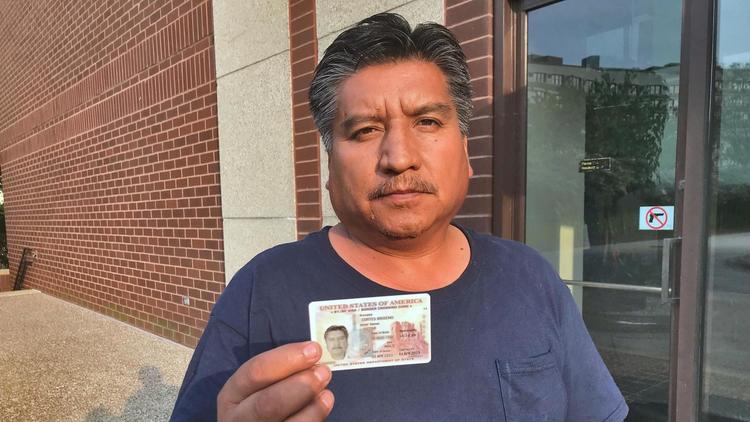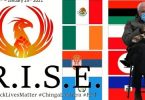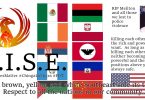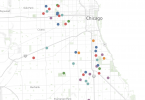Confident that his paperwork was in order, Victor Cortes, a Mexican national, decided to take a vacation to the Chicago area with his tourist visa. He didn’t imagine that his trip would be ruined by a nationwide crackdown on immigrants sanctioned by U.S. President Donald Trump.
A day after arriving to his friend’s house in Joliet, a city 40 miles outside Chicago, Cortes, 49, was arrested, intimidated and humiliated by immigration officials despite having clearance to enter the country, he said.
Cortes and his friend, Guillermo Hernandez, a mechanic by trade who himself is undocumented, were among the 156 people arrested in an operation by Immigration and Customs Enforcement (ICE) agents in 37 cities and townships in the state of Illinois between May 18th and May 24th.
ICE defines such immigration sweeps, which they claim are targeted and not random, as “operations” and not raids. According to the agency, only half of those arrested had a criminal record; the rest appeared to be collateral arrests.
Cortes arrived in bus to the Chicago area that Friday. His entry to the United States had already been authorized by border officials in Laredo, Texas. The next day, on the 19th, the two friends went to get something to eat at El Ranchito Supermarket, 561 E. Cass St., Joliet. While Cortes waited in the truck to look after his friend’s work tools, Hernandez went inside to shop.
But on their way home, Hernandez noticed sirens behind him. When he pulled over, three plainclothes officers wearing caps that read “ICE” got out of an unmarked car. In English, they asked Hernandez for his name, what he did for a living, and repeatedly asked to know where he lived.
Hernandez was immediately handcuffed. As Cortes did not understand or know how to communicate in English, and he had left his documents at Hernandez’s home, he was also handcuffed.
“Even though they were not questioning me, I felt the verbal aggression against my friend,” he said.
By then visibly intimidated, Hernandez directed the three agents to his home at 516 Florence Ave., Joliet, said Cortes; when they arrived they searched the property for more immigrants and arrested another unidentified person who lived there.
While at the house, Cortes searched his suitcase for his Mexican passport, his B1/B2 visa that was issued in April 2013, and his I-94 form—the same documents he used to cross the border—and gave them to ICE.
“This isn’t good,” shouted one agent as he threw the card at him. “Your visa does not allow you to come into my country all the way over here. You can only enter 50 miles in (from the border) and you exceeded that by a lot,” said the agent, according to Cortes.
The agents took the three men in two vehicles and drove for another hour around Joliet, apparently “looking for more immigrants,” said Cortes, who asked repeatedly to use the bathroom and was eventually told to go on the side of the road.
Finally, he said, they arrested a total of six people and drove them to a detention center in downtown Chicago.
While they were processing the detainees, ICE officers gave Cortes different versions of why he was detained, including not having a permit to travel, or travelling in excess of 75 miles from the border (as opposed to the 50 miles one agent initially told him).
The ICE office in Texas confirmed to HOY the “temporary detention” of Cortes. In addition, the Consulate General of Mexico in Chicago verified that they spoke with Cortes over the phone while he was in custody.
Some eight hours after he was handcuffed and without any explanation, ICE officials approached Cortes and told him he was free to go, he said.
But Cortes, by then upset and aggravated, refused to leave as a form of protest and demanded to see a lawyer. He vocalized that his rights had been violated. He also didn’t have a place to go or the knowledge to navigate Chicago’s streets.
The officials, frustrated by his lack of cooperation, took the initiative to call the Mexican Consulate on his behalf and put Cortes on the phone, but Cortes didn’t trust them or the people on the other end of the line.
Cortes then insisted that ICE officials arrange for an agent to drive him back to Joliet at around 11 p.m. that night. They agreed and he was handcuffed for the second time.
ICE issued him a new I-94 form, the Arrival and Departure Record that ensures he entered the country supervised; he claimed his original I-94 form was never returned to him.
“I am very disappointed because to me the United States was a role model of how the law is applied and enforced properly, and the rights of each individual upheld. But here people judge you by your appearance,” Cortes observed.
Feeling confused and impotent even after his release, he says that he was a victim of racism and abuse of authority.
Detainees file class-action lawsuit
Two Chicago residents who were arrested in the same operation filed a class-action lawsuit against ICE for racial profiling and making traffic stops without warrants.
According to the lawsuit, represented by the National Immigrant Justice Center (NIJC), ICE officials violated the Immigration and Nationality Act and the 4th Amendment of the U.S. Constitution by not obtaining arrest warrants before making traffic stops to arrest dozens of Latino residents.
One of the plaintiffs, Margarito Castañón, was driving his work van when officers in an unmarked vehicle and wearing vests that read “POLICE” stopped him at the corner of 31st St. and Cicero Ave. in Chicago. The officers asked Castañón and his passenger for their identification, took their fingerprints, and photographed them. Without justification, the agents handcuffed them and took them away. Until they arrived to downtown Chicago did Castañon learn that the officers were not police officers, but ICE agents.
Another plaintiff was arrested along with his co-workers at the corner of 48th and Wood St. Upon getting pulled over, the driver showed the officers his TVDL license, a valid form of ID for drivers in Illinois, including undocumented immigrants, but that did not protect him or his passengers.
Jeffrey Middlesworth is an attorney currently working on three similar cases in the Illinois suburbs of Lyons and Palatine and is looking to join the NIJC lawsuit, he told HOY.
“Unfortunately ICE has a lot of right to stop people and ask about their legal status. They usually do not have arrest warrants, but it is illegal for them to stop someone just because they look Hispanic. They cannot stop a vehicle just because the people who travel in it seem Latino or of any race. With this type of violation, we can close an immigration case because all the evidence is tossed out in court,” he explained.
NIJC is counting on the lawsuit to represent all the detainees from the May ICE operation so that they are not deported immediately and the arrests can be scrutinized by a judge.
Cortes is looking to see if he and Hernandez are eligible to be part of the suit, said activist Toribio Barrera who is helping him recover from the experience.
Although he declared to the U.S. government that he would be in Illinois for two weeks, Cortes said with tears in his eyes that his only priority at the moment is to look out for his friend “Memo” who is still in custody by ICE.







